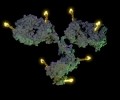Touchlight secures $2.4m to prove pandemic potential of synthetic DNA vector

The funding of US$2.4m from that international organization will go towards pre-clinical development of the company’s proprietary doggybone DNA (dbDNA) vaccine platform, which Touchlight says enables rapid and scalable DNA manufacture in a significantly smaller footprint than can be achieved with fermentation-based processes.
The company has generated data, which is unpublished, showing that enzymatic dbDNA vaccines can produce strong neutralising antibodies and durable T cell responses following vaccine administration in nanoparticles, Helen Horton, chief research officer, Touchlight, told BioPharma-Reporter.
The research being funded by the Gates Foundation "will provide the necessary validation required to demonstrate effectiveness of the platform and provide the potential to move forward into clinical testing."
As part of the grant, Touchlight will also be investigating the performance of dbDNA for therapeutic monoclonal antibody production. The idea here, said Horton, is "to further explore the potential of formulated dbDNA to produce therapeutic relevant levels of monoclonal antibodies in vivo."
Collaboration
Touchlight’s synthetic DNA is already widely utilized across the genetic medicine market, in areas such as critical starting material for viral vector and mRNA vaccine production, genome editing and DNA vaccine applications.
In July, the UK headquartered company agreed to a non-exclusive patent license for Pfizer to utilize its dbDNA. Under the license agreement, the pharma giant gains rights to Touchlight’s dbDNA patent portfolio for worldwide use in the manufacture and commercialization of its messenger RNA-based vaccines, therapeutics, and gene therapies.
A deal announced in September between Touchlight and Lonza sees the Swiss CDMO expand its end-to-end offering for mRNA manufacturing by providing its customers with seamless access to the UK biotech's enzymatic DNA technology.











